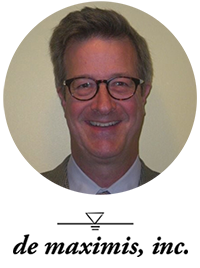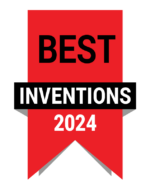 For Bruce Thompson, the rigorous training of the U.S. Naval Academy, where he earned his BS degree in Oceanography, provided the appropriate foundation for a successful career in environmental project management. As a Senior Project Director and board member at de maximis, inc., a leading environmental project management firm and valued REGENESIS client, Thompson continues to leverage the leadership and management experience he garnered as a commissioned Naval officer to make an impact in the field of environmental remediation. He shares, “de maximis was founded in 1988 and I was recruited and came aboard in 1991, so I was one of the early employees. I was hired right out of the U.S. Navy, where I had been teaching leadership and management to newly commissioned officers. Prior to that, I was a Division Officer on the USS IOWA, a WWII era battleship homeported in Norfolk, VA.” Now in his 27th year at de maximis, inc., Thompson clearly enjoys his work, and continues to help the firm pursue its overarching goal as the leading provider of comprehensive project coordination and management services for environmental investigation and remediation projects.
For Bruce Thompson, the rigorous training of the U.S. Naval Academy, where he earned his BS degree in Oceanography, provided the appropriate foundation for a successful career in environmental project management. As a Senior Project Director and board member at de maximis, inc., a leading environmental project management firm and valued REGENESIS client, Thompson continues to leverage the leadership and management experience he garnered as a commissioned Naval officer to make an impact in the field of environmental remediation. He shares, “de maximis was founded in 1988 and I was recruited and came aboard in 1991, so I was one of the early employees. I was hired right out of the U.S. Navy, where I had been teaching leadership and management to newly commissioned officers. Prior to that, I was a Division Officer on the USS IOWA, a WWII era battleship homeported in Norfolk, VA.” Now in his 27th year at de maximis, inc., Thompson clearly enjoys his work, and continues to help the firm pursue its overarching goal as the leading provider of comprehensive project coordination and management services for environmental investigation and remediation projects.
A Diverse Range of Remediation Responsibilities
His role with de maximis, inc. includes managing staff and services for New England, which covers a diverse range of remediation sites and responsibilities. He continues, “I serve as the Project Coordinator for work under Administrative Orders on Consent (AOCs) and Consent Decrees (CDs). The Project Coordinator is the lead technical person for the PRP Group, and is responsible for the administrative, technical, and financial aspects of the project. Additionally, the Project Coordinator is the counterpart to the EPA Remedial Project Manager. Currently, I’m serving as the Project Coordinator for projects including the Solvents Recovery Service of New England (SRSNE) Site in Southington, CT; the Nuclear Metals, Inc. (NMI) Site in Concord, MA; Industri-plex OU2 in Woburn, MA; York Oil OU1 and OU2 in Moira, NY; and the Auburn Road Landfill in Londonderry, NH.” When asked why he enjoys working with REGENESIS, Thompson cites the company’s professional, technology-focused reputation. “REGENESIS brings an excellent technical approach to evaluating each site and tailors the application of their products to create a recipe to meet the unique site goals required,” he says. “I saw their PlumeStop® presentations at the 2016 and 2018 Battelle conferences and discussed the product with REGENESIS’ technical staff. The application of in-situ carbon for certain types of plumes made a lot of sense. I basically filed it away in my mental “tool box” to look at if the right need came up at one of our sites.” The SRSNE site was our first project to use PlumeStop®, and included REGENESIS’ Aqua ZVI™ product as well. The project went beyond dealing with low-concentration VOCs – adding PFAS to the contaminants needing to be addressed. Thompson continues, “Based on the success of that project, I proposed the use of PlumeStop® at an EPA Region II CERCLA site, where we had low concentrations of BTEX that needed to be treated. We just finished that injection last month.”
Although he has nearly three decades of experience under his belt, Thompson knows first-hand the importance of keeping up with new technologies in a constantly evolving industry. He routinely attends professional conferences, and notes that over the years he has had an opportunity to work with and learn from some great individuals in the remediation industry. When asked what he enjoys most about his work, he reflects on the satisfaction that comes with working on a project from start to finish. “The most rewarding part for me is seeing a project through the entire process,” he says. “I have been fortunate to have had the opportunity to take several sites through the remedial investigation and feasibility study processes, and then through the remedial design and remedial action steps.” And the most demanding aspect? “Starting up a new site and trying to get my head around the myriad of issues, data, site conceptual modeling, and other elements of a large, challenging site. Large-scale, long-term sites are complex and have a lot of nuances to sort out.”
Issues Emerge, Get Traction, and Become Understood
When he’s not working, Thompson, who lives in Simsbury, CT with his wife, enjoys skiing. “I grew up in California and learned to ski in Tahoe,” he says. “It’s an activity I’ve been able to share and enjoy with both of our daughters. I also try to be a “slope chaperone” for an after-school ski club each January. We use all 625’ vertical feet of the Ski Sundown area in New Hartford, CT. It’s not much, but it is only 20 minutes away. We also explore Vermont and New Hampshire ski areas when we can.” In addition, he has mentored some high school students who have expressed interest in the environmental field. When asked how he’s seen the industry change over the years, Thompson responds by sharing his observations on contaminant identification and initial awareness. He continues, “I’ve watched the process of an issue emerge, get traction, and then become understood multiple times. For example, we delineated DNAPL (dense non-aqueous phase liquid) at one of my first projects in 1993. We hired a recent PhD named Bernie Kueper to help us understand this new type of problem before there was the guidance and books now available on the topic. Trichloroethylene has gone from being considered toxic to bacteria, to us now sending off samples for qPCR analysis to quantify the DHC that is degrading it. Next was 1,4-dioxane, and now we’re dealing with PFAS.” When it comes to the future of environmental remediation he points to the importance of efficient operations and maintenance. He concludes, “Due to the types of projects I am involved with, I feel there is a need to continue to optimize long-term operations and maintenance (O&M). All of my current sites have very long O&M horizons, so we want to be as cost-effective as we can over time.”
REGENESIS is proud to have Bruce Thompson, Sr. Project Director and board member of de maximis, inc., as a valued client in environmental remediation, and appreciates his expertise and ongoing efforts in providing successful remediation outcomes for REGENESIS and its clients.

 Americas
Americas Europe
Europe Français
Français Deutsch
Deutsch Italiano
Italiano Español
Español



